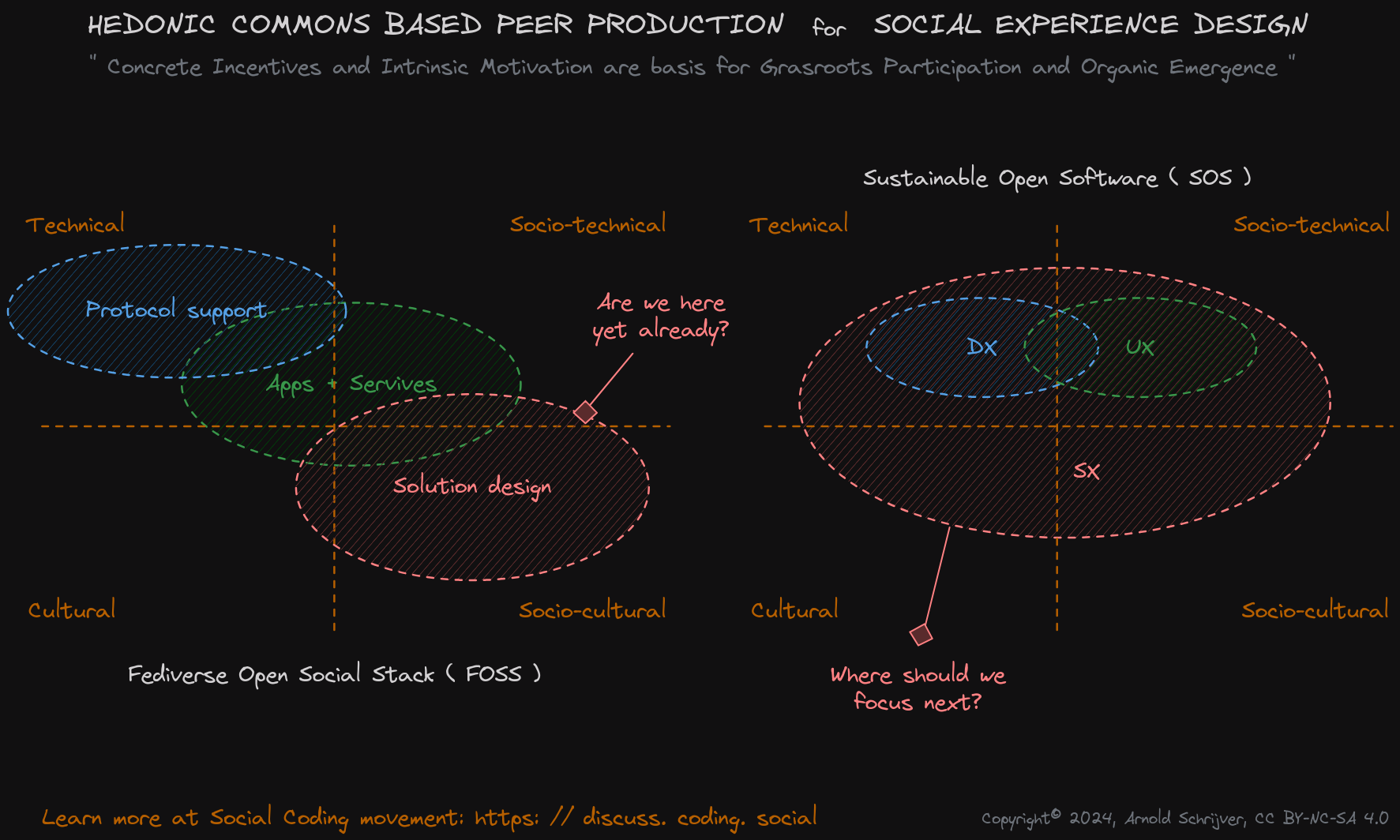In Guild Alpha Workroom on matrix, @Tomat0 just posed the following idea:
Something that randomly popped in my mind just now, but im thinking it might be worthwhile to see if we can set up codeberg as an OAuth2 provider on the forums/other tools?
OAuth2 provider | Forgejo – Beyond coding. We forge.SSO would be nice for onboarding ppl so they dont have to make multiple accounts to access multiple tools, just one account we can point them to register as
My answer: Maybe.
In itself it is an interesting idea, and I encourage you to follow-up to this topic, so we may evolve it further. Yet in itself this is a purely technical proposal, i.e. part of what I call the “technosphere”.
Social coding movement - rebranded yesterday as “Social coding commons” - is focused on “Social experience design” for “SOSS initiatives” that follow a sustainability-first approach to software co-creation (which is more inclusive than merely ‘development’) of Social web solutions.
SOSS is “Sustainable FOSS” and means Sustainable open social systems / software / services / solutions. SOSS continues where FOSS becomes inherently unsustainable and even de facto detrimental to its own ideological foundations, by benefiting mostly the bad actors in modern-day society. SOSS initiatives plan their project workflows based on the Free software development lifecycle (FSDL).
To pick up on the idea would require an approach that places people’s needs first (needs-driven development). Who do we want to onboard, why do we want to onboard them, for what purpose exactly, and who does the onboarding? That are some of the relevant questions to be answered. And mostly ignored in FOSS circles.
The “FOSS movement” is on a sure death march in rear-guard fights in the age of AI madness, all-powerful Big Tech, and festering techno-fascist ideologies. And FOSS by not addressing its sustainability issues, is even to an extent complicit to this, blissfully unaware that is benefits the bad actors most of all, feeding into hypercapitalism. Our technosphere is destroying the pillars of democracy and unraveling the social fabric of society.
Now, social coding commons has real answers to all of this. Obvious ones, that we all know already: “If everyone just did their part”. Same as the solution for the climate crisis. However, there’s one huge difference: We aren’t dependent on hypercapitalist power elites to also fall in line with what Humanity needs. We already have large groups of value-aligned, like-minded people who are intent on contributing their 2 cents to help improve the world.
The only thing we don’t know is how to organize in any meaningful way, and become as capable as e.g. Big Industry that’s able to uphold hyper complex global supply lines. This is the true challenge, and this is what Social coding commons is seeking to achieve. And we have found a working methodology to do so… hedonic commons-based peer production and social experience design.
This then indicates another need: The identity solution and auth/authz must support the concept of “Working in commons” that protects the common interests of the People. Here is (a slightly outdated) diagram depicting the new field of Social experience design to be explored for the next-gen Social web:
See also “Proposal: Start a fellowship to explore the Social web” and “Wiki: Vision for a Fedi specification” (an initiative started by @helge).
Coincidentally I bumped into a neat decentralized identity FOSS project just announced by Steve Leach and it is a good showcase the “technospheric approach” followed by the FOSS ‘movement’:
We have “Show, don’t tell” of a decentralized identity GPL-licensed code project. Cool! It is a great strength of FOSS that people who have the time and passion publish their work or hobby efforts.
But what is the intent of the project? What can we expect? What is expected of us in return? What hopes and dreams drive this initiative? That is entirely unclear at this point. We may look at the result of a hackathon. Or maybe we see the first open foundations of the sustainable business that Steve intends to launch. Who knows.
Some people, mostly developers, find the existence of the code already providing enough incentive to proactively participate in the project and become a contributor. And from there by typical “design-by-consensus” issue-driven development things mature and evolve. A project community and ecoystem may form over time.
BUT: Until a more holistic development approach is followed the project will remain in the technosphere, and attracting primarily a technical audience that tends to keep it (stuck?) in the technosphere.
The urgent need of the Social coding commons in these dark times is this:
Need: Leverage the dormant power of the grassroots movement and enable co-creation at scale.
This is a need that exists in the sociosphere. A need that relates to a wicked problem and can only be tackled by prolonged, multi-pronged, highly collaborative solution focus.
And then a project like iden in this early stage is a best a mention on a shortlist or technology radar.
There are probably 1,000’s of small and large efforts that focus on the domain of ‘online identity’, and a similar amount pursuing peer-to-peer networking solutions. A custodian of the commons involved in SOSS as a technology decision-maker would gauge these projects for their chances of becoming broadly adopted as sustainable, robust enabling technologies. Foundations of the open social stack, and in support of social networking, both online an offline. To serve the needs of the people in day-to-day life.
The custodian would select the technology based on its ability to support a Peopleverse.
